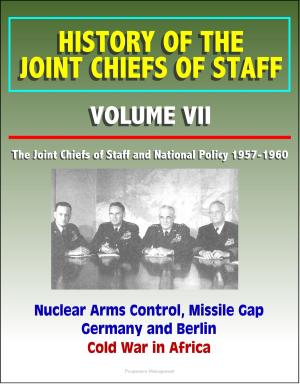India and Pakistan Civil: Military Relations – Review of Military Coup Potential, Khan Deposing Mirza, Bhutto Replacing Khan, Zia-ul-Haq Deposing Bhutto, Sino-Indian War, Gandhi Declaring Emergency
Nonfiction, History, Asian, India, Military, Strategy| Author: | Progressive Management | ISBN: | 9781370707904 |
| Publisher: | Progressive Management | Publication: | February 18, 2017 |
| Imprint: | Smashwords Edition | Language: | English |
| Author: | Progressive Management |
| ISBN: | 9781370707904 |
| Publisher: | Progressive Management |
| Publication: | February 18, 2017 |
| Imprint: | Smashwords Edition |
| Language: | English |
This excellent report has been professionally converted for accurate flowing-text e-book format reproduction. This monograph develops a theory that explains civil-military relationships throughout a wide range of interactions between a society and the society's military. The monograph uses this theory to explain the civil-military relationships in India and Pakistan. Both countries achieved their independence from Great Britain. They had culturally similar militaries and both countries faced tremendous stresses during their independence. However, in Pakistan the military became involved in civil governance, while in India, the military remained under civilian control. The case of India and Pakistan provides a comparative case study to examine why a military does or does not control a state and why a military remains in control or returns power to civilians.
Studying the recent history of India and Pakistan reinforces the importance of legitimacy and coercion in the relationships of their militaries and their societies. Current literature on civil-military relations does not explain the full spectrum of the interactions between societies and their militaries. Much of the available literature focuses on the relationship of a military and its government in a democratic society. Most of the remaining literature focuses on a certain event, such as a coup. This monograph develops a theory that explains civil-military relationships throughout a wider range of activities. The monograph uses this theory to explain the civil-military relationships in India and Pakistan after these countries achieved their independence. India and Pakistan have many similarities. Both countries achieved their independence from Great Britain. Both countries had culturally similar militaries, and both countries faced tremendous stresses during their early years after independence. However, in Pakistan the military would become involved in civil governance, while in India, the civilians firmly control the military.
This excellent report has been professionally converted for accurate flowing-text e-book format reproduction. This monograph develops a theory that explains civil-military relationships throughout a wide range of interactions between a society and the society's military. The monograph uses this theory to explain the civil-military relationships in India and Pakistan. Both countries achieved their independence from Great Britain. They had culturally similar militaries and both countries faced tremendous stresses during their independence. However, in Pakistan the military became involved in civil governance, while in India, the military remained under civilian control. The case of India and Pakistan provides a comparative case study to examine why a military does or does not control a state and why a military remains in control or returns power to civilians.
Studying the recent history of India and Pakistan reinforces the importance of legitimacy and coercion in the relationships of their militaries and their societies. Current literature on civil-military relations does not explain the full spectrum of the interactions between societies and their militaries. Much of the available literature focuses on the relationship of a military and its government in a democratic society. Most of the remaining literature focuses on a certain event, such as a coup. This monograph develops a theory that explains civil-military relationships throughout a wider range of activities. The monograph uses this theory to explain the civil-military relationships in India and Pakistan after these countries achieved their independence. India and Pakistan have many similarities. Both countries achieved their independence from Great Britain. Both countries had culturally similar militaries, and both countries faced tremendous stresses during their early years after independence. However, in Pakistan the military would become involved in civil governance, while in India, the civilians firmly control the military.















